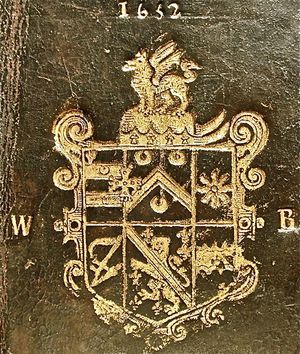Difference between revisions of "William Brereton 1604-1661"
| Line 1: | Line 1: | ||
__NOTITLE__ | __NOTITLE__ | ||
===[[personal title::Sir]] [[name::William]] [[name::BRERETON]], 1st [[personal title::bart]] [[date of birth::1604]]-[[date of death::1661]]=== | ===[[personal title::Sir]] [[name::William]] [[name::BRERETON]], 1st [[personal title::bart]] [[date of birth::1604]]-[[date of death::1661]]=== | ||
| − | [[File:BreretonWilliamSir1.jpg| thumb | + | [[File:BreretonWilliamSir1.jpg| thumb | Armorial stamp of Sir William Brereton (British Armorial Bindings]] |
====Biographical Note==== | ====Biographical Note==== | ||
Son of [[family::William Brereton]] of [[location::Handforth, Cheshire]], and a member of a family which had accumulated extensive land and estates in and around [[location::Chester]] since the 16th century. Matriculated at [[education::Brasenose College, Oxford]] 1621, but did not graduate; admitted at [[organisations::Gray's Inn]] 1624. He mixed active business interests with extensive travelling across Europe during the 1620s and 30s and was created a [[personal title::baronet]] in 1627. [[occupation::MP]] for [[location::Cheshire]] 1628 and 1640, where he became a strong supporter of the parliamentary cause, and a [[occupation::military commander]] of their forces in the north during the early 1640s, engaging in numerous battles and sieges. As part of his reward for success, he acquired the sequestered [[associates::Archbishop of Canterbury]]'s palace at [[location::Croydon]], which became his main residence for the rest of his life. He continued as an [[occupation::MP]] in the 1650s and a member of the Council of State, but is noted as less active in national affairs and more inclined to retire to the fruits of his conquests. | Son of [[family::William Brereton]] of [[location::Handforth, Cheshire]], and a member of a family which had accumulated extensive land and estates in and around [[location::Chester]] since the 16th century. Matriculated at [[education::Brasenose College, Oxford]] 1621, but did not graduate; admitted at [[organisations::Gray's Inn]] 1624. He mixed active business interests with extensive travelling across Europe during the 1620s and 30s and was created a [[personal title::baronet]] in 1627. [[occupation::MP]] for [[location::Cheshire]] 1628 and 1640, where he became a strong supporter of the parliamentary cause, and a [[occupation::military commander]] of their forces in the north during the early 1640s, engaging in numerous battles and sieges. As part of his reward for success, he acquired the sequestered [[associates::Archbishop of Canterbury]]'s palace at [[location::Croydon]], which became his main residence for the rest of his life. He continued as an [[occupation::MP]] in the 1650s and a member of the Council of State, but is noted as less active in national affairs and more inclined to retire to the fruits of his conquests. | ||
| Line 13: | Line 13: | ||
====Sources==== | ====Sources==== | ||
<div id="sourcelist"> | <div id="sourcelist"> | ||
| + | *[https://discovery.nationalarchives.gov.uk/details/r/D838389 Will of Sir William Brereton, The National Archives PROB `11/305/172]. | ||
*[https://armorial.library.utoronto.ca/stamp-owners/BRE001 British Armorial Bindings]. | *[https://armorial.library.utoronto.ca/stamp-owners/BRE001 British Armorial Bindings]. | ||
*Morrill, John. [https://doi.org/10.1093/ref:odnb/3333 "Brereton, Sir William, first baronet (1604–1661), parliamentarian army officer."] ''Oxford Dictionary of National Biography''. | *Morrill, John. [https://doi.org/10.1093/ref:odnb/3333 "Brereton, Sir William, first baronet (1604–1661), parliamentarian army officer."] ''Oxford Dictionary of National Biography''. | ||
| Line 23: | Line 24: | ||
[[Category:Members of Parliament]] | [[Category:Members of Parliament]] | ||
[[Category:Armorial Stamps]] | [[Category:Armorial Stamps]] | ||
| + | [[Category:All Owners]] | ||
Revision as of 07:19, 26 July 2020
Sir William BRERETON, 1st bart 1604-1661
Biographical Note
Son of William Brereton of Handforth, Cheshire, and a member of a family which had accumulated extensive land and estates in and around Chester since the 16th century. Matriculated at Brasenose College, Oxford 1621, but did not graduate; admitted at Gray's Inn 1624. He mixed active business interests with extensive travelling across Europe during the 1620s and 30s and was created a baronet in 1627. MP for Cheshire 1628 and 1640, where he became a strong supporter of the parliamentary cause, and a military commander of their forces in the north during the early 1640s, engaging in numerous battles and sieges. As part of his reward for success, he acquired the sequestered Archbishop of Canterbury's palace at Croydon, which became his main residence for the rest of his life. He continued as an MP in the 1650s and a member of the Council of State, but is noted as less active in national affairs and more inclined to retire to the fruits of his conquests.
Books
A number of Brereton's books are noted in the armorials database, rather grandly stamped with his arms, initials and a date, all from the 1650s, which supports that view of the last decade of his life as one of more comfort and state. In his will, he directed that John Brereton, minister, should have the choice of 12 divinity books from his study at Handforth, and that two of his executors, Robert Blayney and Thomas Case, should each select 6 divinity books from his study at Croydon. Otherwise, books are not mentioned in his will, but they would have passed with the rest of his estate to his son Thomas, 2nd baronet (d.1674). Examples: CUL Sel.4.11; Corpus Christi, Oxford LE.12.81; NLS Ry.IV.f.21.
Characteristic Markings
The armorial bindings are stamped as noted above.
Sources
- Will of Sir William Brereton, The National Archives PROB `11/305/172.
- British Armorial Bindings.
- Morrill, John. "Brereton, Sir William, first baronet (1604–1661), parliamentarian army officer." Oxford Dictionary of National Biography.
